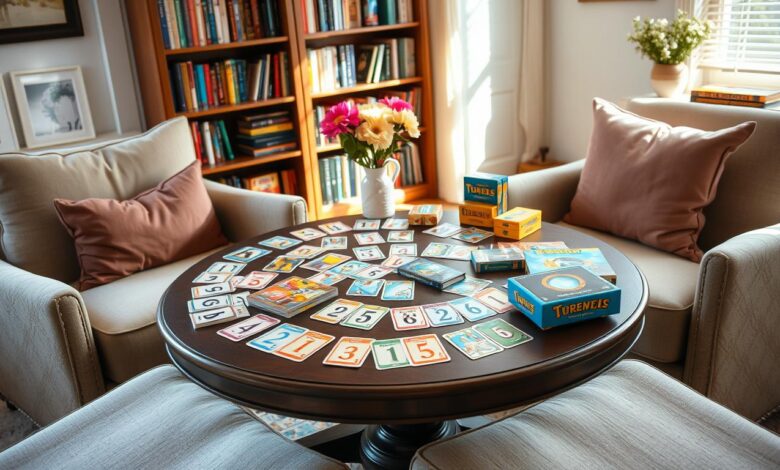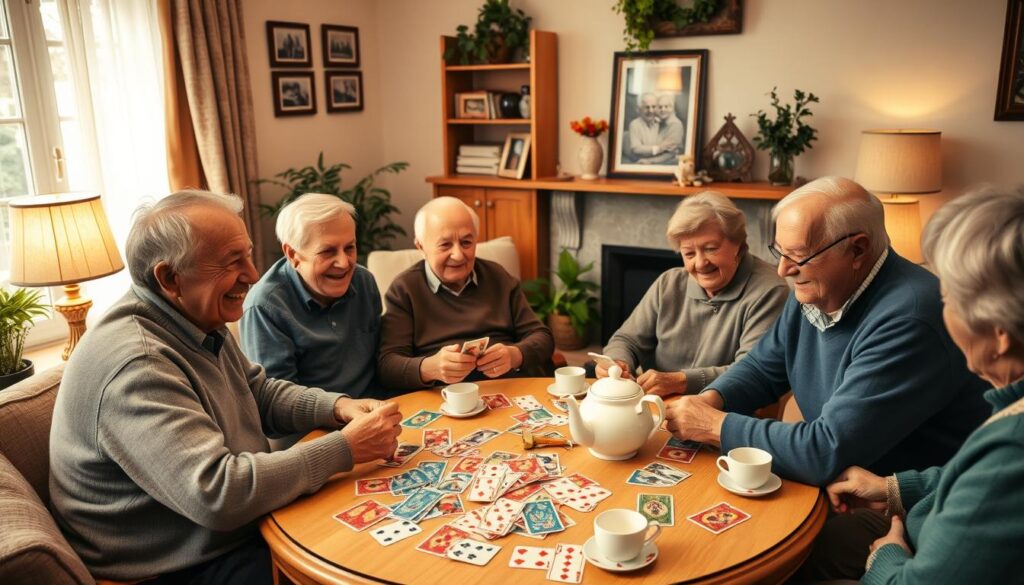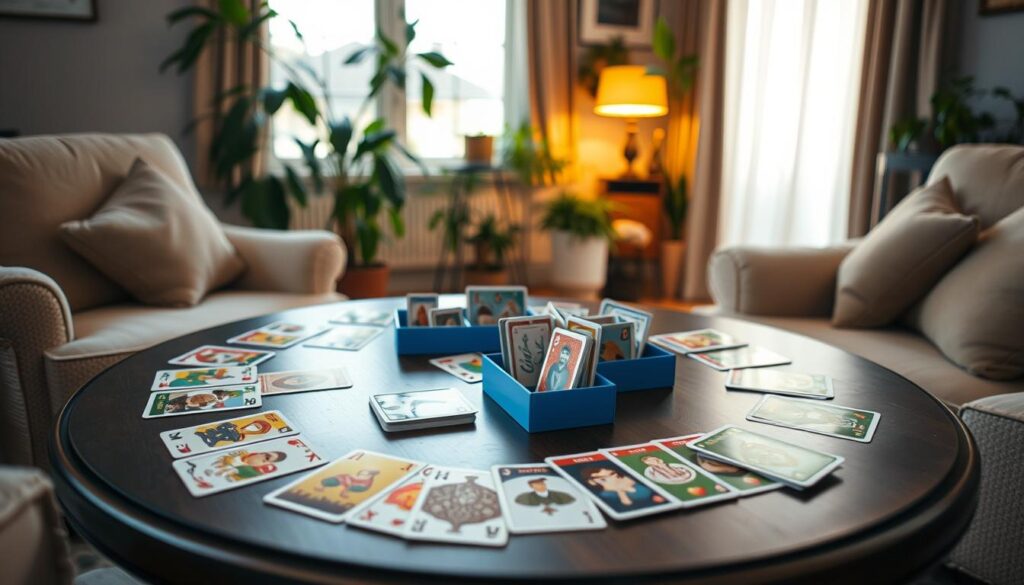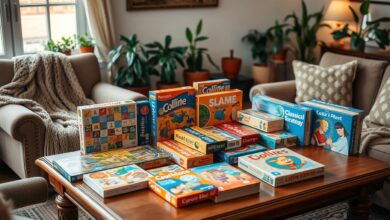Educational Card Games for Elderly Individuals – Learn & Play

As we age, it’s crucial to keep our minds sharp. For many seniors, playing card games is a deeply meaningful activity. These games not only challenge our minds but also help us connect with others and boost our self-esteem.
Imagine hosting a card party with friends or neighbors. The laughter and friendly competition create an uplifting atmosphere. Games like Gin Rummy, Phase 10, and UNO provide endless fun and opportunities to learn.
Educational Card Games for Elderly offer a perfect blend of entertainment and mental stimulation, making them an excellent choice for seniors.
Table of Contents
Understanding the Benefits of Card Games for Senior Mental Health
As we get older, keeping our minds sharp and staying connected with others is key. Card games offer a fun way to do just that. They help improve memory, problem-solving, and even reduce stress. Playing games like these can greatly benefit your mental health.
Cognitive Stimulation and Memory Enhancement
Dementia is a big concern for many seniors, leading to a decline in thinking skills. But, studies show that playing brain games can slow this decline. Card games, in particular, boost memory and problem-solving in older adults, helping them stay mentally sharp.
Social Interaction Benefits
For seniors with dementia, staying socially connected is crucial. It helps fight off feelings of loneliness. Playing cards with friends or others in senior communities can create a sense of belonging. It supports both mental and emotional health.
Stress Reduction and Emotional Well-being
Playing card games can also have a calming effect, reducing anxiety and confusion in individuals with dementia. It helps focus the mind and connect with others. This can lead to a better emotional state and a higher quality of life for seniors.
“65% of adults age 50-plus engage in playing games with their friends, with card games being the most popular choice among older adults.”
Educational Card Games for Elderly Individuals: A Comprehensive Guide
Age-appropriate learning card games are great for keeping elderly minds sharp. These interactive brain games for seniors are fun and help improve thinking skills. They also help seniors stay connected and feel good.
Games like Scrabble Slam and I Doubt It are classics. New games like UNO Dare Game and UNO Splash are also exciting. These games test players’ skills and offer a fun way to socialize. They can be changed to fit the needs of seniors with physical or mental challenges.
Playing these games is good for senior mental health. A 2019 study showed that games can improve memory and thinking in older adults. Playing games like puzzles or card games can even help create new brain cells. This can slow down memory loss and thinking problems linked to dementia.

Adding age-appropriate learning card games to an elderly person’s life is a smart move. These interactive brain games for seniors keep minds active and promote social and emotional health. By playing these games, seniors can stay mentally sharp and enjoy life more.
Classic Card Games with Learning Elements
Classic card games are great for older adults. They offer fun and help keep the mind sharp. Games like these improve skills in pattern recognition, strategy, and problem-solving.
Gin Rummy for Pattern Recognition
Gin Rummy is perfect for improving pattern recognition. Players look for sets and runs in their hand and on the table. This sharpens their eyesight and helps them spot patterns.
Bridge for Strategic Thinking
Bridge is a game that tests strategic thinking and memory. It involves bidding and trick-taking, making it a challenge for seniors. It helps them plan, predict, and make smart choices, boosting their thinking skills.
Solitaire Variations for Problem-solving
Solitaire and its many versions are great for problem-solving. Players try to clear the cards, improving their analytical and decision-making skills. It also gives a sense of achievement.
These games can be played with regular decks or special ones for those with vision problems. They make sure everyone can join in. By playing these games, seniors get to have fun and keep their minds active.
Memory-Enhancing Card Game Options
Playing memory games is key for keeping the mind sharp in older adults. These games test your memory and can be made easier or harder. Adding fun themes or pictures makes them more enjoyable for seniors.
Concentration (also known as Memory) is a classic game. Players flip cards to find matching pairs. This game sharpens short-term memory and visual skills. Old Maid also tests memory by making players remember which cards have been played.
“A 2022 study from China indicated that playing cards correlated with better cognitive function in older adults.”
Free apps like Blackbox – Brain Puzzles, Scrabble GO, and Words with Friends are great for keeping minds active. They help older adults, even those with dementia, stay sharp. These games boost thinking skills and may lower dementia risk.
- Chess can fight off Alzheimer’s and boost memory.
- Number games like Sudoku need problem-solving and memory. They give a feeling of achievement.
- Memory games like the tray game improve memory by using different brain parts.
Adding different memory games to your routine helps keep your brain healthy. It may even delay dementia. Don’t forget, exercise, good sleep, and a healthy diet are also vital for brain health.

Social Card Games for Group Learning
Playing social card games is a great way for the elderly to learn new things and make friends. Games like UNO, Skip-Bo, and Phase 10 are fun and good for the brain. They help seniors learn and connect with others.
UNO and Its Educational Variants
UNO is a simple yet powerful game for learning. It helps seniors recognize colors and numbers. Variants like UNO Dare Game and UNO Splash make it even more challenging and fun.
Skip-Bo for Number Sequencing
For those who love organizing, Skip-Bo is perfect. It teaches number sequencing as players build piles in order. It’s a game that’s both fun and mentally stimulating.
Phase 10 for Pattern Building
Phase 10 is all about recognizing patterns. Players work on sets and sequences, improving their strategic thinking. It’s a great way for seniors to learn and have fun together.
Adding these card games to social activities can make a big difference. Care facilities and community centers can become lively places. They help seniors grow their minds and build friendships.
Adapting Traditional Card Games for Senior Learning
As we get older, our brains might change, but we don’t have to stop playing card games. We can make traditional card games easier for seniors. This way, they can still have fun and learn new things.
One way to make classic card games easier is to simplify the rules. For instance, we can make Cribbage focus more on counting and recognizing patterns. Games like Euchre or Spades can also be changed to focus on teamwork and talking, not just complex strategies.
We can also use bigger cards or add visual aids like colors or symbols. This helps seniors with vision or dexterity problems. These changes make age-appropriate learning card games fun and easy for senior-friendly card games.
“Adapting traditional card games for senior learning is a great way to keep our minds sharp and stay connected with friends and family as we age.” – Jane Doe, Gerontologist
With these small changes, seniors can keep enjoying their favorite games. They can also learn new things and stay well.
- Simplify game rules to focus on cognitive skills like counting, pattern recognition, and communication.
- Use larger print cards or visual aids to make the game pieces more accessible for seniors.
- Encourage social interaction and collaboration by adapting team-based card games.
- Explore classic card games like Cribbage, Euchre, and Spades with a focus on age-appropriate learning.
By making these changes, seniors can keep enjoying card games. They get mental stimulation, social fun, and better emotional health.
Therapeutic Benefits of Educational Card Games
Educational card games are great for older adults. They can help prevent dementia and improve fine motor skills. These games also offer cognitive stimulation and emotional comfort, keeping seniors’ minds sharp and their spirits high.
Dementia Prevention Exercises
Playing strategy games or puzzles can help build cognitive reserve. This can lower the risk of dementia and Alzheimer’s. Research shows that older adults who play board games feel less depressed and anxious.
Fine Motor Skills Development
Games that need hand-eye coordination, like card dealing, keep seniors’ dexterity sharp. Handling small game pieces in card games also helps keep these important physical skills strong.
Adding educational card games to daily routines boosts brain connections. This helps seniors keep their mental abilities longer. These games improve cognitive skills and emotional health, enhancing seniors’ quality of life.
“A study published in the Journal of Gerontology found that older adults who participated in cognitively stimulating activities, such as board games, experienced reduced symptoms of depression and anxiety.”
When picking a card game for seniors, think about their physical and mental abilities. Look for games that are easy to learn and fun to play. Both new and classic card games offer cognitive benefits and social interaction, helping seniors in many ways.
Modern Card Games Designed for Elderly Learning
Modern card games are becoming key tools for seniors to learn and keep their minds sharp. These games mix the classic charm of card games with features made just for older adults.
“Sagacity” is a game that tests players’ strategic thinking and memory. It has levels that adjust to the player’s skill and tracks progress. This helps seniors keep improving their thinking skills.
“Brain Games: Cards” offers a wide range of card activities for seniors. It includes games that boost memory and ones that challenge logic. This game is a great way for seniors to enjoy interactive brain games for seniors and age-appropriate learning card games.
Digital versions of classic card games have also become popular. They track progress, score automatically, and let players adjust the difficulty. These features help keep seniors engaged and feeling accomplished.
“Modern card games for seniors offer a unique blend of traditional gameplay and innovative features that cater to the cognitive needs and preferences of older adults, empowering them to learn, grow, and stay mentally sharp.”
Modern card games are a great way for seniors to enjoy interactive brain games for seniors and age-appropriate learning card games. They help seniors keep their minds active, build social connections, and improve their overall health.
Creating an Engaging Card Game Environment for Seniors
Creating a fun and welcoming space for seniors to play card games is key. It boosts social interaction, keeps their minds sharp, and improves their overall well-being. By setting up cozy playing areas and planning regular game times, you make a space they’ll love coming to.
Setting Up Comfortable Playing Areas
Make sure the space for card games is comfy and free from distractions. Offer good seating and bright lighting to help with vision issues. Use a big table or smaller ones for group play. Keep the area tidy and quiet to help seniors focus.
Organizing Regular Game Sessions
Having a set time for card games helps seniors feel a sense of routine. Host weekly or monthly “card parties” for them to play senior-friendly card games. Add fun themes or special events, like According to Hoyle Day on August 29th, to make it exciting.
By making a space for social games for the elderly welcoming, you encourage them to play. This helps their minds stay sharp, builds friendships, and enhances their life quality.
“Games are the most elevated form of investigation.”
– Albert Einstein
Safety and Accessibility Considerations
When introducing age-appropriate learning card games for the elderly, safety and accessibility are key. Make sure the environment is comfortable and safe for seniors to enjoy fully.
To stop cards from sliding, use non-slip mats on the playing areas. For those with arthritis or limited dexterity, card holders can help. Good lighting is essential, and magnifying glasses should be available if needed.
- Arrange tables and chairs to fit mobility aids in group settings.
- Always have water ready and plan regular breaks to avoid fatigue during long senior-friendly card games sessions.
“Playing sit-down games has been found to reduce levels of depression among the elderly by providing a sense of purpose, enjoyment, and accomplishment.”
By focusing on safety and accessibility, you can make a fun and welcoming space for seniors. Here, they can learn and play age-appropriate learning card games with confidence and ease.
Conclusion
Educational card games bring many benefits to the elderly. They help keep the mind sharp, build social connections, and improve mood. There are many games for different interests and skills.
Playing these games regularly can make a big difference. It helps seniors stay mentally active and feel connected. This can greatly improve their quality of life.
Using educational card games in care settings or at home is a great idea. As more people age, these games will become even more important. They offer fun ways to keep the mind active and reduce loneliness.
Healthcare providers, caregivers, and families can greatly benefit from these games. They support the well-being of older adults. These games are a fun way to promote healthy aging and independence.
FAQ
What are the benefits of educational card games for elderly individuals?
What are some popular educational card game options for seniors?
How can traditional card games be adapted for senior learning?
What are the therapeutic benefits of educational card games for the elderly?
How can an engaging card game environment be created for seniors?
What safety and accessibility considerations are important for senior card games?
Source Links
- 5 Card Games To Teach Your Senior Residents – S&S Blog – https://www.ssww.com/blog/5-card-games-to-teach-your-senior-residents/?srsltid=AfmBOop3OdA7vQwECM2LPhjhunh_I-2Xaq1uMnpclplCOdY9Hn22vBw9
- Vita Solitaire for Seniors – https://apps.apple.com/us/app/vita-solitaire-for-seniors/id6446669987
- Top Puzzle Games for Seniors to Stay Sharp and Active – Westmont Living – https://westmontliving.com/blog/westmont-of-santa-barbara/memory-care/top-puzzle-games-for-seniors-to-stay-sharp-and-active/
- Improve your brain health by changing your routines – https://www.dementiamap.com/enhancing-cognitive-health-the-benefits-of-brain-games-for-seniors-with-dementia/
- From Cards to Candy Crush: Unveiling the Health Perks of Playing Games with Friends – https://www.aarp.org/pri/topics/social-leisure/activities-interests/health-benefits-game-play-older-adults/
- 5 Card Games To Teach Your Senior Residents – S&S Blog – https://www.ssww.com/blog/5-card-games-to-teach-your-senior-residents/?srsltid=AfmBOoroxKBqY1gq0bEqZd_YTSBGb3yRErd0-b-Dj2scWuef6Fe73EP5
- Games for Seniors with Dementia – https://www.ultimatecareny.com/resources/games-for-seniors-with-dementia
- Best Memory Games for Seniors – https://www.aplaceformom.com/caregiver-resources/articles/senior-care-home-memory-games
- 21 Games for Seniors: Sharpen Your Mind & Have Fun | Cascade Living Group – https://www.cascadeliving.com/blog/games-for-seniors/
- Unlocking the Benefits of Card Games for Seniors | Companion Care at Home – https://www.blhc.org/unlocking-the-benefits-of-card-games-for-seniors/
- Brain Games for Dementia: Examples and Why They Help – https://www.healthline.com/health/alzheimers-dementia/memory-games-for-dementia
- 10 Games to Improve Memory for Elderly People | Lottie – https://lottie.org/care-guides/10-games-to-improve-memory-for-elderly-people/
- 51 Great Games for Seniors & Elderly People | Lottie – https://lottie.org/carecollective/games-for-elderly-people/
- 5 Card Games To Teach Your Senior Residents – S&S Blog – https://www.ssww.com/blog/5-card-games-to-teach-your-senior-residents/?srsltid=AfmBOopBQ84ylMNsfei_ZB0ujg3PTDORQSnDz5Bg6LdjyUTFUmKLYAG1
- Here’s What to Play When You’re Over 55 and Love Having Fun – https://www.greatseniorliving.com/articles/games-for-seniors
- Cognitive Benefits of Card Games for Older Adults – https://www.247solitaire.com/news/cognitive-benefits-of-card-games-for-older-adults/
- Brain Games For Seniors – https://seniorhealthcaresolutions.com/blog/brain-games-for-seniors/
- Activities for the Elderly – https://www.humancareny.com/blog/activities-for-the-elderly
- Top Friendly Board Games for Seniors and Cognitive Benefits – Westmont Living – https://westmontliving.com/blog/westmont-of-fresno/memory-care/top-friendly-board-games-for-seniors-and-cognitive-benefits/
- 5 Types of Brain Stimulating Activities for the Elderly – https://chelseahc.com/education/brain-stimulating-activities-for-elderly/
- The Benefits of Playing Board Games for Cognitive Health – Jewish Senior Life of MI – https://jslmi.org/the-benefits-of-playing-board-games-for-cognitive-health/
- Vita FreeCell for Seniors – https://apps.apple.com/us/app/vita-freecell-for-seniors/id6450493164
- The Best Card Games – https://www.nytimes.com/wirecutter/reviews/best-card-games/
- 10 Board Games for Older Adults & Seniors 2024 – https://www.zupee.com/blog/board-games-for-older-adults/
- Fun Games to Play with Seniors in Senior Living – https://somerbysandysprings.com/fun-games-to-play-with-seniors-in-senior-living/
- Engaging Sit Down Games for Elderly Entertainment – https://www.h2hhc.com/blog/sit-down-games-for-seniors
- Sit Down Games for Seniors – https://www.ultimatecareny.com/resources/sit-down-games-for-seniors
- Top Sit-Down Games For Senior Citizens – https://www.parxhhc.com/resources/sit-down-games-for-senior-citizens
- Frontiers | Aging with board games: fostering well-being in the older population – https://www.frontiersin.org/journals/psychology/articles/10.3389/fpsyg.2024.1501111/full
- Development and Validation of a Game for Older Adults on Lifestyles and Frailty – https://www.mdpi.com/2039-4403/14/3/184




